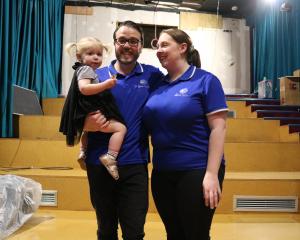
In the early ’00s, Alonso Ruizpalacios was not the gifted, ingenious director he is today — the man behind A Cop Movie, a slippery psychodrama that breaks the laws of documentary, and the new La Cocina, starring Rooney Mara as a waitress at a hectic New York restaurant. Back then, he wore baggy khaki shorts and welcomed customers to the Rainforest Cafe, its plastic foliage and animatronic wildlife, in Piccadilly Circus. "Hi, I’m Alonso and I’ll be your safari guide today," he would say. "You guys been here before? No? Well, this is Bamba, our gorilla. Occasionally there will be rain showers, but — hey — don’t be afraid, you won’t get wet!"
The film-maker grimaces at the memory. "You had to give the whole spiel," he says.
Ruizpalacios, who was raised in Mexico City by parents who are both doctors, is 47, with dense stubble, curly black hair and chunky-framed Harry Palmer-style glasses. Give or take the same lopsided smile, he doesn’t look much like the budding matinee idol in his Rada headshot. "I got into acting because I wanted to be a director," he says. "And I needed to understand actors."
They’re all nuts, right?
"They’re strange creatures for sure," he replies diplomatically. "Frail, vain, brave. Full of contradictions. I could say many things. I don’t want to say the wrong thing." After all, he is married to one: Ilse Salas, who starred in his 2014 debut, Gueros, a road movie that goes stylishly in circles, and Museo, with Gael Garcia Bernal as one of the perpetrators of a real-life museum heist.
While studying at Rada, Ruizpalacios worked to earn his keep, which is where the Rainforest Cafe came in. He can draw a direct line between that experience and La Cocina. For starters, the film is adapted from Arnold Wesker’s 1957 play The Kitchen, which he first read while at Rada. "Wesker’s play made the restaurant seem tolerable. But during my first few weeks in the job, I would have nightmares every night, imagining I was still at work and the orders were running late." Directors and chefs aren’t so dissimilar, and he concedes that there is a "militarised" hierarchy to film sets and kitchens alike. "But I’m no Gordon Ramsay."
La Cocina is a lively, relentless portrait of American working life, set during one day below stairs at The Grill, with its staff of immigrants, many of them undocumented, from the Dominican Republic, Mexico and Morocco. Among them is the sous chef Pedro (the director’s regular collaborator Raul Briones), who is in love with Julia, played by Mara.
Isn’t there a risk of imbalance when a performer like Mara joins a cast of less feted or recognisable actors?
"There is," he admits, "but I wanted a Hollywood star because that’s how Julia is in Pedro’s mind. Though she’s actually very grounded."
What about Mara herself? Don’t A-listers come with entourages, even their own chefs to rival the fictional ones of La Cocina?
"We kept all that to a minimum," he says with a knowing smile. "We weren’t a big production; we shot all the interiors in Mexico. And Rooney is very grounded, just like Julia. As one of my teachers at Rada used to say: ‘Nobody s**** jam’."
La Cocina is shot in a dreamy monochrome, which calls to mind Coppola’s Rumble Fish. As do the film’s absurdist touches: an unseen rat tugging a pizza along the street, or a malfunctioning soda machine that floods the submarine-like kitchen with Cherry Coke as if in some sugary spin on Das Boot.
Ruizpalacios chose black-and-white to help render the film timeless.
"You don’t know when it’s taking place. That’s why there are no mobile phones. I wanted something beyond realism."
But that approach was also one of several sticking points for potential financiers.

Even after the success of Roma, directed by Alfonso Cuaron.
"Roma is an anomaly, I think, because Cuaron is such a big name.
"People were also put off because I insisted on Raul in the lead role instead of a star. And this is a kitchen film with no food porn. And half of it is in Spanish."
Don’t forget it also has one character contemplating an abortion.
"A studio we went to said: ‘Can we not have the abortion storyline?’. I was, like: ‘That’s one of the main parts!’. It’s insane that we’re still talking about a woman’s right to choose."
Surely the popularity of other frantic kitchen-based dramas such as The Bear and Boiling Point must have assuaged backers’ concerns.
"We were already in pre-production when The Bear came out. I still haven’t seen it: I didn’t want it to influence what we were doing."
Had La Cocina been shot in colour, minus the abortion storyline, and with, say, Jacob Elordi as Pedro, there would still be no expunging the text’s inherent anti-capitalist bent.
"It’s about how the capitalist machine leaves no room for dreams," Ruizpalacios says, alluding to the central sequence in which the kitchen staff are overwhelmed by orders during the lunchtime rush. "At the beginning, they’re talking about other things, little inner conflicts. As it progresses, there’s no room for the personal, and it’s all orders, orders, orders. It shows how relationships are obliterated by the rhythm of capitalism and work, and the pressure to keep the production line going. That was one of the scenes that kept me thinking about the play all these years. But the feedback we got was opposed to this kind of film, which criticises the American working ethos, and the way migrants are treated. That makes it an uncomfortable watch."
If the situation was bad when Ruizpalacios and I met last year, a month before the US election, it has grown immeasurably graver since then. The director has been busy finishing a new script: his adaptation of Juan Jose Saer’s western The Clouds, about psychiatric patients being led across the desert to a new hospital, which he has transposed to the late 1840s and the Mexican-American war.
There are even bigger problems afoot. La Cocina represents a list of Donald Trump and JD Vance’s pet hates: undocumented immigrants, abortion, anti-capitalism. How does it feel to be releasing the film into such a hostile world?
"I think it only makes it more urgent and poignant," he says.
"I see a lot of caution ahead in the US. I see peers who are careful about what they say, what they put out. As a foreigner, it’s different because I have no skin in that game."
Presumably he still wants to work in the United States, though: he recently directed three episodes of the Star Wars spin-off series Andor.
"Yeah, but working in Mexico, too, gives you a different perspective. There’s a whole life beyond Hollywood." — The Observer













